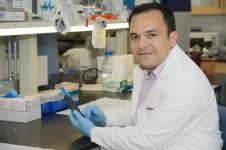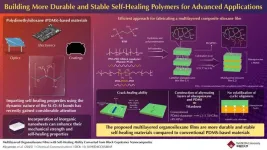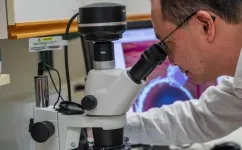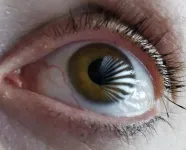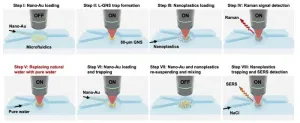While antiretroviral therapy (ART) has improved the life expectancy of people with AIDS, a lack of effective diagnostics and disease management tools has hindered its global implementation. Only 59% of those in need have access to treatment, and about one in four people living with HIV are unaware of their status. Additionally, individuals on ART who adhere to uninterrupted treatment may experience viral rebound between viral load tests, remaining unaware of treatment failure and potentially infectious for weeks or even months.
A major challenge in combating HIV is the lack of self-testing technologies that can detect new infections during the first two weeks (acute phase) or identify viral rebound in patients on ART. To date, no self-test has been developed to detect HIV in the acute phase or during viral rebound in suppressed patients.
To address the urgent need for a reliable, rapid and affordable self-test for early HIV detection, researchers from the College of Engineering and Computer Science, in collaboration with the Charles E. Schmidt College of Medicine, at Florida Atlantic University, have been awarded phase-II of a five-year, $1.3 million grant from the National Institute of Allergy and Infectious Diseases at the National Institutes of Health.
The grant will support the development of an innovative disposable microchip technology designed for HIV-1 self-testing during the first two weeks post-infection, as well as for monitoring viral rebound in ART-suppressed patients. The technology also will be broadly applicable to other infectious diseases such as flaviviruses, hepatitis, tuberculosis, malaria and SARS-CoV-2.
“Nearly 40% of people infected with HIV are not on suppressive treatment, despite first-line antiretroviral therapy being affordable or even freely available,” said Waseem Asghar, Ph.D., principal investigator, a professor and associate chair in FAU’s Department of Electrical Engineering and Computer Science and Department of Biomedical Engineering. “This is largely due to the lack of easy-to-use HIV diagnostics for self-testing. What’s needed is a low-cost, accessible platform for HIV testing that can improve diagnosis during the acute phase of infection, help identify treatment failure and enhance disease management to better control disease progression.”
Unlike expensive HIV tests today, researchers expect the FAU technology to cost less than $5 per test. Current HIV tests, such as PCR-based assays, are costly, require expensive lab equipment, skilled technicians and reagents ($50 to $200 per test), making them unsuitable for self-testing. Miniaturized versions exist but are labor-intensive, while other tests are costly, require refrigeration and have long turnaround times. Additionally, rapid tests that detect HIV antibodies are ineffective for early detection, as antibodies appear three to four weeks after infection.
Leveraging expertise in microchip fabrication, microfluidics, isothermal amplification, imaging, and microelectronics, the project team will develop the HIV-1 self-testing chip capable of selectively detecting HIV in whole blood samples.
The assay being developed by Asghar and Massimo Caputi, Ph.D., co-investigator and a professor in FAU’s Department of Biomedical Science within the College of Medicine, will detect HIV during the acute infection phase or viral rebound, deliver rapid results and remain stable without refrigeration. The handheld device will be battery-powered and operate fully automated, providing true “sample-in-answer-out” functionality that requires minimal user manipulation.
After loading the blood sample into the magnetic actuation platform, results will be available within 40 minutes – a significant improvement over conventional assays that take several hours and require clinical lab infrastructure.
“Development of this novel self-testing technology is a game changer because it addresses a fundamental gap in HIV detection and management, particularly in impoverished areas where access to health care is limited,” said Stella Batalama, Ph.D., dean of the College of Engineering and Computer Science. “By developing an affordable, easy-to-use self-testing platform, we can empower individuals to detect HIV early, reduce transmission and improve treatment outcomes. This innovation has the potential to save countless lives, offering hope to those who otherwise might not have access to timely care, ultimately helping to curb the global HIV epidemic.”
The project team includes Una O’Doherty, M.D., Ph.D., professor of pathology and laboratory medicine at Emory University School of Medicine, who will serve as the team’s chief clinic advisor; and Patrick E. Jackson, M.D., an assistant professor of infectious diseases, University of Virginia, who will provide clinical expertise on aspects of HIV self-testing.
- FAU -
About FAU’s College of Engineering and Computer Science:
The FAU College of Engineering and Computer Science is internationally recognized for cutting-edge research and education in the areas of computer science and artificial intelligence (AI), computer engineering, electrical engineering, biomedical engineering, civil, environmental and geomatics engineering, mechanical engineering, and ocean engineering. Research conducted by the faculty and their teams expose students to technology innovations that push the current state-of-the art of the disciplines. The College research efforts are supported by the National Science Foundation (NSF), the National Institutes of Health (NIH), the Department of Defense (DOD), the Department of Transportation (DOT), the Department of Education (DOEd), the State of Florida, and industry. The FAU College of Engineering and Computer Science offers degrees with a modern twist that bear specializations in areas of national priority such as AI, cybersecurity, internet-of-things, transportation and supply chain management, and data science. New degree programs include Master of Science in AI (first in Florida), Master of Science and Bachelor in Data Science and Analytics, and the new Professional Master of Science and Ph.D. in computer science for working professionals. For more information about the College, please visit eng.fau.edu.
About Florida Atlantic University:
Florida Atlantic University, established in 1961, officially opened its doors in 1964 as the fifth public university in Florida. Today, Florida Atlantic serves more than 30,000 undergraduate and graduate students across six campuses located along the Southeast Florida coast. In recent years, the University has doubled its research expenditures and outpaced its peers in student achievement rates. Through the coexistence of access and excellence, Florida Atlantic embodies an innovative model where traditional achievement gaps vanish. Florida Atlantic is designated as a Hispanic-serving institution, ranked as a top public university by U.S. News & World Report, and holds the designation of “R1: Very High Research Spending and Doctorate Production” by the Carnegie Classification of Institutions of Higher Education. Florida Atlantic shares this status with less than 5% of the nearly 4,000 universities in the United States. For more information, visit www.fau.edu.
END
